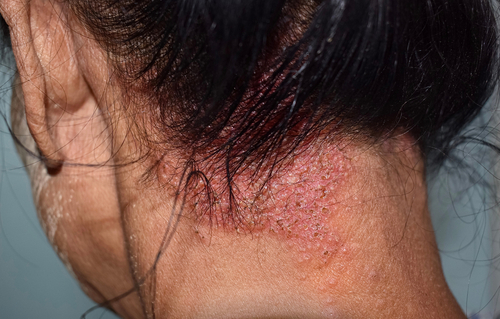Guselkumab (Tremfya, Johnson & Johnson) results in clear or almost clear skin in the majority of adults with low body surface area (BSA) moderate plaque psoriasis with special site involvement (scalp, face, skin folds and genitals) who had failed topical treatment, according to data from the Phase 3b SPECTREM study presented at 2024 Fall Clinical Dermatology Conference in Las Vegas, NV.
“People who have special site plaque psoriasis with lesions that cover a smaller total area of their body are often only prescribed topical treatments and not considered candidates for advanced therapies, as treatment decisions are often driven by body surface area coverage and not symptomatic burden,” says study author Linda Stein Gold, MD, Director of Dermatology Clinical Research at Henry Ford Health in Detroit, MI, in a news release. “Results of the SPECTREM study could represent a new approach to care for patients with low body surface area psoriasis, as the majority of patients treated with TREMFYA achieved clear or almost clear skin.”
A significantly greater proportion of patients who received guselkumab, a monoclonal antibody against interleukin-23, achieved the primary endpoint of an Investigator’s Global Assessment (IGA) score of cleared (0) or minimal disease (1) compared to those who received placebo (74.2% versus 12.4%, respectively). These results were comparable irrespective of baseline BSA.
In special areas, there was significant clearance (defined as site-specific IGA 0/1 response) versus placebo at Week 16: scalp (75.0% versus 14.5%), face (87.8% versus 28.6%), intertriginous (86.5% versus 28.8%) and genital (78.0% versus 37.5%)
Complete clearance of each special site was consistently achieved in the majority of patients who received guselkumab versus placebo: scalp (60.3% versus 9.3%), face (75.7% versus 23.9%), intertriginous (76.6% versus 24.2%) and genital (72.7% versus 32.7%).
Statistically significant improvements were also achieved across all major secondary endpoints, including:
- 52.9% achieved a Psoriasis Area Severity Index (PASI) 90 response compared to 6.2% of participants who received placebo.
- The average patient saw over 80% improvement from baseline for both BSA and PASI compared to those who received placebo (80.6% versus 6.1% and 82.6% versus 13.7%).
Participants also reported improved quality of life impact after three doses of guselkumab. Specifically, a greater proportion of guselkumab -treated patients achieved:
-
- Dermatology Life Quality Index (DLQI) scores of 0/1 compared to patients receiving placebo (48.9% versus 3.5%).
- A 4-point greater improvement from baseline in Psoriasis Symptoms and Signs Diary (PSSD) itch compared to placebo (62.7% versus 12.5%).
The overall safety in the SPECTREM study was consistent with the established guselkumab safety profile.


